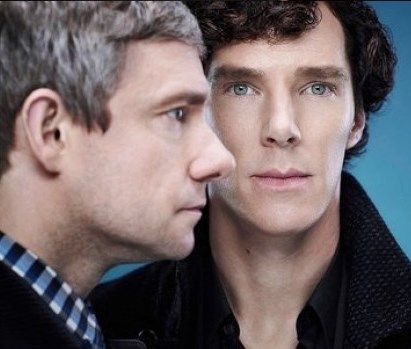
BBC Sherlock Fan Forum - Serving Sherlockians since February 2012.
- silverblaze
- Official Blogger
 Offline
Offline - From: Netherlands
- Registered: December 4, 2013
- Posts: 1,353
Re: Sherlock's love for John
Schmiezi wrote:
When I've first seen the the scene, I was very touched by how sad John seems to be, and was quite surprised when I've read that other people considered him cold or distant.
I shared that surprise. I thought it was incredibly sad and incredibly well acted.
- LightPurple
- Homeless Network
 Offline
Offline - Registered: January 20, 2014
- Posts: 33
Re: Sherlock's love for John
silverblaze wrote:
Schmiezi wrote:
When I've first seen the the scene, I was very touched by how sad John seems to be, and was quite surprised when I've read that other people considered him cold or distant.
I shared that surprise. I thought it was incredibly sad and incredibly well acted.
I'm relieved that I'm not the only one to think that way ![]()
- Willow
- Consulting Criminal
 Offline
Offline - Registered: January 14, 2014
- Posts: 858
Re: Sherlock's love for John
'Actually I can't think of a single thing to say'
is what John says to Sherlock at the beginning of their final scene together, immediately reminding us of his 'these are prepared words' to Mary. I suspect that consciously or otherwise many of the people disturbed by John's behaviour in this last scene are picking up on that link. After all, if he can come up with some prepared words for Mary then he could take the time and trouble to prepare some words for Sherlock.
There is a further contrast with Sherlock in the second episode; we see him devoting vast amounts of time and intellectual energy to working out his Best Man's speech. Again, those are prepared words, and yet John does not reciprocate when the time comes for Sherlock to go.
I am sure that Sherlock and John's friendship will survive, not least because there isn't a 'Sherlock' without it, but I do understand why people have some problems with that final scene between them. In other words, John looking soulful doesn't make up for John not preparing some words...
- silverblaze
- Official Blogger
 Offline
Offline - From: Netherlands
- Registered: December 4, 2013
- Posts: 1,353
Re: Sherlock's love for John
Willow wrote:
'Actually I can't think of a single thing to say'
is what John says to Sherlock at the beginning of their final scene together, immediately reminding us of his 'these are prepared words' to Mary. I suspect that consciously or otherwise many of the people disturbed by John's behaviour in this last scene are picking up on that link. After all, if he can come up with some prepared words for Mary then he could take the time and trouble to prepare some words for Sherlock.
We've had very different reactions to that scene then. For me, an honest 'being at loss for words' feels way more emotional and authentic than a prepared speech, beautiful as it might be.
- Willow
- Consulting Criminal
 Offline
Offline - Registered: January 14, 2014
- Posts: 858
Re: Sherlock's love for John
silverblaze wrote:
Willow wrote:
'Actually I can't think of a single thing to say'
is what John says to Sherlock at the beginning of their final scene together, immediately reminding us of his 'these are prepared words' to Mary. I suspect that consciously or otherwise many of the people disturbed by John's behaviour in this last scene are picking up on that link. After all, if he can come up with some prepared words for Mary then he could take the time and trouble to prepare some words for Sherlock.We've had very different reactions to that scene then. For me, an honest 'being at loss for words' feels way more emotional and authentic than a prepared speech, beautiful as it might be.
I can certainly understand your view; the writers, or rather Moffat since he apparently wrote this script by himself, do use language almost as an exercise in seeing how many linked references they can squeeze in to the 90 minutes. But I did feel that Sherlock's Best Man speech was both emotional and authentic, even though it was prepared, so it's difficult for me to dismiss it easily...
- KeepersPrice
- Official Blogger
 Offline
Offline 
- From: Andover, Massachusetts
- Registered: June 8, 2012
- Posts: 1,721
Re: Sherlock's love for John
Moffat said in some Q&A session that when he was writing the Best Man speech where Sherlock acknowledged what a flawed man he was, he cried like a baby while writing it. He could be pulling our leg but I don't see Moffat as completely cruel and heartless to the fans, so I'm willing to give it some credence. It was a lovely moment in the speech and, yes, seemed heartfelt and authentic.
Of course, then SM pulled the 'guy thing' during the Q&A by diffusing his emotional reveal by saying something like 'men cry just like women only men's tears are bigger with more snot'.
Guy lesson 101 - when getting too close to emotional vulnerability, break the tension with humor.
---------------------------------------------------------------------------------------------------------------------------------------------
And I said "dangerous" and here you are.
You. It's always you. John Watson, you keep me right.

- silverblaze
- Official Blogger
 Offline
Offline - From: Netherlands
- Registered: December 4, 2013
- Posts: 1,353
Re: Sherlock's love for John
KeepersPrice wrote:
Of course, then SM pulled the 'guy thing' during the Q&A by diffusing his emotional reveal by saying something like 'men cry just like women only men's tears are bigger with more snot'.
Guy lesson 101 - when getting too close to emotional vulnerability, break the tension with humor.
Works on women too, at least on this woman. Though I totally want that story to be true.
I didn't dismiss the best man's speech, I found it very moving and appropriate. But if I had to choose between this way of handling the airport scene or something more similar to the best man speech, I'd still go for this. People don't generally go into full shakespeare when they say goodbye. But that's just my personal taste.
- Willow
- Consulting Criminal
 Offline
Offline - Registered: January 14, 2014
- Posts: 858
Re: Sherlock's love for John
silverblaze wrote:
KeepersPrice wrote:
Of course, then SM pulled the 'guy thing' during the Q&A by diffusing his emotional reveal by saying something like 'men cry just like women only men's tears are bigger with more snot'.
Guy lesson 101 - when getting too close to emotional vulnerability, break the tension with humor.Works on women too, at least on this woman. Though I totally want that story to be true.
I didn't dismiss the best man's speech, I found it very moving and appropriate. But if I had to choose between this way of handling the airport scene or something more similar to the best man speech, I'd still go for this. People don't generally go into full shakespeare when they say goodbye. But that's just my personal taste.
And long may it continue; otherwise we wouldn't have anything to discuss ![]()
- Mattlocked
- One More Miracle
 Offline
Offline 
- From: Germany
- Registered: June 29, 2012
- Posts: 6,781
Re: Sherlock's love for John
silverblaze wrote:
People don't generally go into full shakespeare when they say goodbye.
Love that! Would be a perfect signature! ![]()
__________________________________
"After all this time?" "Always."
Good bye, Lord Rickman of the Alan
- SusiGo
- The game is never over (moderator)
 Offline
Offline 
- From: Germany
- Registered: June 5, 2012
- Posts: 22,969
Re: Sherlock's love for John
Indeed, Mattlocked. I just watched the airport scene once again. It is emotional in a wonderfully understated way. No coldness on John's part, just suppressed feelings.
------------------------------
"To fake the death of one sibling may be regarded as a misfortune; to fake the death of both looks like carelessness." Oscar Wilde about Mycroft Holmes
"It is what it is says love." (Erich Fried)
“Enjoy the journey of life and not just the endgame. I’m also a great believer in treating others as you would like to be treated.” (Benedict Cumberbatch)

- LightPurple
- Homeless Network
 Offline
Offline - Registered: January 20, 2014
- Posts: 33
Re: Sherlock's love for John
Willow wrote:
'Actually I can't think of a single thing to say'
is what John says to Sherlock at the beginning of their final scene together, immediately reminding us of his 'these are prepared words' to Mary. I suspect that consciously or otherwise many of the people disturbed by John's behaviour in this last scene are picking up on that link. After all, if he can come up with some prepared words for Mary then he could take the time and trouble to prepare some words for Sherlock.
There is a further contrast with Sherlock in the second episode; we see him devoting vast amounts of time and intellectual energy to working out his Best Man's speech. Again, those are prepared words, and yet John does not reciprocate when the time comes for Sherlock to go.
I am sure that Sherlock and John's friendship will survive, not least because there isn't a 'Sherlock' without it, but I do understand why people have some problems with that final scene between them. In other words, John looking soulful doesn't make up for John not preparing some words...
It's not unusual that when you sit at home and imagine what you want to say to a person who means a lot to you, you come up with a thousand things you could say to them. But as soon as you stand in front of that person - especially if the encounter has an emotional reason - your mind goes completley blank and you can't think of single thing to say any more. Lucky you if you never have been in that sitution, I'd say ![]() And I think that's exactly what happened to John there. I'm sure he had prepared words he could say to Sherlock, but he didn't write them down on cuecards. And seriously, how cold would that have been if John had just pulled a few cuecards out of his pockets? The fact that he had forgotten everything he had wanted to say just tells me how emotional this was for him. The fact that he hadn't forgotten what to tell Mary just tells me that he was MORE emotional about Sherlock's departure.
And I think that's exactly what happened to John there. I'm sure he had prepared words he could say to Sherlock, but he didn't write them down on cuecards. And seriously, how cold would that have been if John had just pulled a few cuecards out of his pockets? The fact that he had forgotten everything he had wanted to say just tells me how emotional this was for him. The fact that he hadn't forgotten what to tell Mary just tells me that he was MORE emotional about Sherlock's departure.
As far as Sherlock's Best Man Speech is concerned, he had months to prepare that speech (and yes, I do think it was genuine) and he had books to help him along the way. I think John had only about a week or so and there are no books about how to say goodbye to your best friend who has just thrown away his life for you and whom you're probably never going to see again.
And at last, if you think John should have said how much Sherlock means to him in that last scene, you should just for a minute think back to the end of The Reichenbach Fall: When Sherlock jumped off that rooftop in front of John's eyes, he didn't tell him anything like "You have been a great friend and you didn't do anything wrong. There's nothing you could have done to prevent this". Just imagine how that must have felt for John, living for two years with the thought in his mind that Sherlocks's "suicide" could have been his fault, that he could have, should have done something to prevent it.
So yes, neither John nor Sherlock are perfect when it comes to those goodbye scenes and I think this is what makes them so believable and human.
- Schmiezi
- Reichenbach Survivor
 Offline
Offline 
- From: NRW, Germany
- Registered: August 10, 2012
- Posts: 5,478
Re: Sherlock's love for John
LightPurple wrote:
So yes, neither John nor Sherlock are perfect when it comes to those goodbye scenes and I think this is what makes them so believable and human.
Absolutely. I think that after all the deep feelings in that episode another Shakespearian, melodramatic scene would have been to much.
---------------------------------------------------------------------------------------------------------------------------------------------------------------------------------
I still believe that love conquers all!


"Quick, man, if you love me."
- Willow
- Consulting Criminal
 Offline
Offline - Registered: January 14, 2014
- Posts: 858
Re: Sherlock's love for John
Schmiezi wrote:
LightPurple wrote:
So yes, neither John nor Sherlock are perfect when it comes to those goodbye scenes and I think this is what makes them so believable and human.
Absolutely. I think that after all the deep feelings in that episode another Shakespearian, melodramatic scene would have been to much.
Actually, my original comment was that a quiet 'thanks, mate' would not have been inappropriate; I agree that an over the top melodratic scene between the pair of them would not have worked. They were saving that for the manic Moriarty gif ![]()
- silverblaze
- Official Blogger
 Offline
Offline - From: Netherlands
- Registered: December 4, 2013
- Posts: 1,353
Re: Sherlock's love for John
Willow wrote:
Actually, my original comment was that a quiet 'thanks, mate' would not have been inappropriate; I agree that an over the top melodratic scene between the pair of them would not have worked. They were saving that for the manic Moriarty gif
Really, that was your point? I completely missed that, the references to prepared words and speeches gave me a different impression. (Not a native speaker.)
Maybe it would have been nice if he said thank you, I don't know. I'm not sure where it would fit as what they're expressing is a certain unease and attempts not to break down. Saying something like that may just have done that. And maybe their bond is too deep for things like that.
- Clancy
- Homeless Network
 Offline
Offline 
- Registered: January 18, 2014
- Posts: 26
Re: Sherlock's love for John
wrt prepared words vs nothing to say; John had only one thing to say to Mary, it was easy enough to prepare (no cue cards needed) whereas IMO he had too much to say to Sherlock and that was why words failed him.
- miriel68
- British Government
 Offline
Offline 
- From: Rome
- Registered: January 28, 2013
- Posts: 636
Re: Sherlock's love for John
I think we should remember that we are not discussing black and white here ("cold" John versus "grieving" John), but rather all the shadows of gray. Obviously John cares for Sherlock deeply. However, there are many small things in TLV that suggest that John is "human" and has his own flaws, too: his not seeing S. "for ages" after his wedding (he wasn't exactly taken by a pressure job in a City, was he?), his not noticing that S. is on the verge of collapsing in Bakerstreet scene... and I would say the same about the farewell scene, also it is kind of subjective feeling. In any case, I for once am very glad that they added some more layers to John's character: always-and-ever-ideal-friend could risk to become a bit boring and we would risk too much syrup in the end scene, as well. ![]()
- LightPurple
- Homeless Network
 Offline
Offline - Registered: January 20, 2014
- Posts: 33
Re: Sherlock's love for John
miriel68 wrote:
I think we should remember that we are not discussing black and white here ("cold" John versus "grieving" John), but rather all the shadows of gray. Obviously John cares for Sherlock deeply. However, there are many small things in TLV that suggest that John is "human" and has his own flaws, too: his not seeing S. "for ages" after his wedding (he wasn't exactly taken by a pressure job in a City, was he?), his not noticing that S. is on the verge of collapsing in Bakerstreet scene... and I would say the same about the farewell scene, also it is kind of subjective feeling. In any case, I for once am very glad that they added some more layers to John's character: always-and-ever-ideal-friend could risk to become a bit boring and we would risk too much syrup in the end scene, as well.
I wholeheartedly agree that I love the fact that John isn't just a one dimentional, flawless character. He never has been (if he was, then why would he himself think in "A Study in Pink" that no one would ever want to share a flat with him?), it's just more obvious in this season.
As far as the not seeing Sherlock "for ages" (one month, as we learn from Mary) is concerned, we don't know how long John and Mary went on their honeymoon. It could have been two or three weeks, so it would not be very uncommon for John not to see his best friend - who was himself busy with Janine and his "undercover" drug habit - for a month. I thought it was quite sweet that not seeing Sherlock for a month felt like "ages" to John. You hardly call one month "ages" if you're not missing the person you're not seeing. Of course, like a lot in this episode, this is all open to subjective interpretation, but that's how I see it.
- besleybean
- Threatened Knighthood
 Offline
Offline 
- From: Carnoustie, Angus, Scotland.
- Registered: October 4, 2012
- Posts: 21,380
Re: Sherlock's love for John
I took it he was trying to get out of helping the neighbour!
---------------------------------------------------------------------------------------------------------------------------------------------------------------
- silverblaze
- Official Blogger
 Offline
Offline - From: Netherlands
- Registered: December 4, 2013
- Posts: 1,353
Re: Sherlock's love for John
I thought the 'ages' remark referred to Whitney. Like he said to the neighbour she'd better ask Sherlock to investigate than come to him, because he really didn't know where he was, hadn't seen him for ages.
- LightPurple
- Homeless Network
 Offline
Offline - Registered: January 20, 2014
- Posts: 33
Re: Sherlock's love for John
silverblaze wrote:
I thought the 'ages' remark referred to Whitney. Like he said to the neighbour she'd better ask Sherlock to investigate than come to him, because he really didn't know where he was, hadn't seen him for ages.
Yes, he said to Whitney that he hand't seen Sherlock "for ages", which Mary corrected into "one month!" Taking into consideration how VERY keen John was on getting out of the house to do his own little inverstigation in the drug den, and just how generally frustrated he seemed in that scene, I don't doubt that he had started to sorely miss his life with Sherlock, and not having been out on a case with Sherlock for a whole month had, indeed, felt like ages to him.

